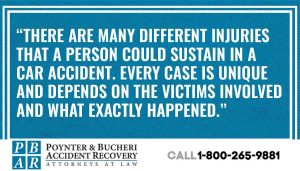
Top 5 Car Accident Injuries

Not all car accidents end in injury, but when they do, you may be entitled to compensation that can help you pay for your car accident injuries and other potential damages.
Car accident injuries not only affect victims physically, but they can also affect a person financially and emotionally. This is why filing a claim and working with an attorney after an accident is so important. Insurance companies often try to downplay car accident injuries to avoid paying victims what they deserve. But if you are struggling physically, emotionally, and financially after an accident, you deserve to be fairly compensated.
In this article, we’ll review some of the most common car accident injuries and what you should do after an accident to ensure you win your case and recover the compensation you need and deserve. If you have further questions after reading this and need help filing a claim for your car accident injuries, don’t hesitate to get in touch with one of our experienced Indianapolis accident attorneys at Poynter & Bucheri.
The Five Most Common Car Accident Injuries
Technically, there are many different injuries that a person could sustain in a car accident. Every case is unique and depends on the victims involved and what exactly happened. However, some injuries do tend to occur more often than others in car accident cases, which include the following:

- Whiplash: This is one of the most common car accident injuries. Whiplash is a type of soft tissue injury that occurs in the neck. When you are in a car accident, the force that travels through the body can cause a back-and-forth whipping motion of the head and neck, which strains the muscles, ligaments, and tendons. This can lead to pain, limited range of motion, headaches, dizziness, and fatigue. Though this type of injury is often considered minor, it can cause severe pain and other symptoms that can sometimes last long-term, which can be debilitating for the victim.
- Traumatic Brain Injuries: Car accidents are among the top three causes of traumatic brain injuries (TBIs). The specific type of TBI can vary greatly, but overall, these kinds of injuries are often severe and can lead to long-term complications, such as bleeding in the brain, loss of bodily function, coma, and even death. Even mild TBIs can result in long-term lingering symptoms that can affect a person’s quality of life and ability to perform daily activities.
- Spinal Cord Injuries: Though spinal cord injuries might seem rare, they happen more often than you might think. Herniated or bulging discs, for example, are a type of spinal cord injury that often occurs due to car accidents. Of course, spinal cord injuries can also be more severe and lead to permanent damage, which can result in limited mobility, loss of bodily functions, long-term pain, and even paralysis. A spinal cord injury can also be fatal in the most severe cases.
- Fractures: Broken bones are another prevalent car accident injury. Broken bones and fractures can occur in minor accidents and severe accidents. For example, a car accident victim could sustain a hairline fracture in their wrist in a minor accident, or they could sustain multiple fractures across their body, some of which can break the surface of the skin and lead to extreme blood loss. The more severe fractures and breaks in car accidents tend to occur with high-speed crashes.
- Emotional Injuries: Not all car accident injuries are physical. It is also quite common for victims to sustain emotional and psychological injuries after an accident due to the trauma they experienced. In some cases, psychological injuries can be more severe and life-altering than physical ones. Physical injuries can heal quickly, depending on the severity, but emotional trauma is much harder to process and heal after a car accident.
What Are Minor Injuries in a Car Accident?
Though the injuries listed above seem severe, it is also possible for a person to only sustain minor injuries in an accident. This can include minor cuts and bruises, sprains or muscle strains, and even minor fractures.
However, it’s important to understand that no matter how minor you think an injury might seem, you should still get checked out by a doctor just to be safe. Some injuries might not seem like a big deal, and you might not even have symptoms immediately, but you never know what could be going on internally. And if you wait too long to get treated by a doctor, it could be too late.
Some internal injuries, for example—like internal bleeding—do not have symptoms that appear immediately. You could feel fine but be bleeding out inside, and by the time you do start to feel unwell, it could be too late to treat the injury. So always seek medical attention after an accident, even if you feel fine.
How Long After a Car Accident Can You Claim Injury?
Every state has a law that dictates how long you have to file a claim for an injury after an accident. This law is known as a statute of limitations.
The statute of limitations for car accident injuries in Indiana is two years. This means you have two years from the date of the accident to file a claim for your injuries.
However, it’s worth noting that while you have two years to file a claim, it’s better to file as soon as possible. This is because evidence of what happened can diminish or be harder to recover over time, but you will need evidence to prove your case and recover the full and fair compensation you deserve.
What to Do After a Car Accident Injury?
Following an accident, the first thing you should do is seek medical attention. Your health and well-being should be your number one priority. Additionally, documentation that proves you were injured and sought treatment will also serve as evidence to help support your claim.
It’s also important that you call the police and ensure they file an official report for the accident, as this will be needed to prove your case when you file a claim. However, do not rely on the police to gather all of the evidence themselves. Police often overlook things, so if you want to build a strong case, you should gather evidence at the accident scene yourself if you can.
Such evidence can include photos and videos of the accident, the car damage, and your injuries. You can also talk to witnesses who saw what happened and get their contact information so they can give a statement for evidence to verify what happened.
Beyond these things, it’s also important to contact a local personal injury attorney after the accident. An attorney can handle the case for you while you focus on rest and recovery. They can help gather evidence, communicate with the other parties involved, and negotiate a fair settlement on your behalf with the insurance company.

How the Poynter & Bucheri Personal Injury Attorneys Can Help
If you have sustained car accident injuries, our team at Poynter & Bucheri can assist you. Our fee is only 25% compared to the higher 40% rates with other attorneys. We will ensure you are properly compensated for your injuries and losses.
Don’t hesitate — one of our experienced attorneys can assist you right away. Call 1-800-265-9881 for a free case review.
